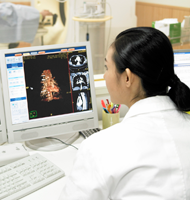Diagnosing cancer involves the use of a variety of tests that provide details about abnormal cells, which may have been detected through routine medical examinations, self-examination, or reported symptoms of cancer. More information about these cells must be gathered in order to identify them as malignant cells (cancerous) or non-malignant cells (non-cancerous), and if they are malignant cells, to determine how serious (aggressive) the particular cancer cells are. Aggressive cancers grow and spread more quickly than less-aggressive or “indolent” cancers. There are many types of tests specifically designed to evaluate cancer. The Halifax Health Centers for Oncology are poised to offer the most advanced diagnostic services available today.
The first step in treating cancer is early detection and accurate diagnosis.
Diagnostic tests are used to accurately diagnose disease, determine prognosis, and monitor cancer for progression or recurrence. Diagnostic tests are used to diagnose primary disease, identify cancer subtype, predict prognosis, direct treatment, evaluate response to treatment, detect minimal residual disease, and monitor remission or progression. There are a number of diagnostic tests that fall into five categories: pathology, diagnostic imaging, blood tests, tumor marker tests, and genomics.

